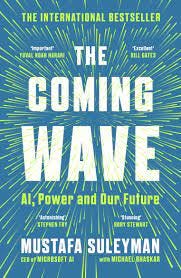Yuval Noah Harari vs Mustafa Suleyman vs Ray Kurzwel on AI
The three brightest minds on Artificial Intelligence (AI).......
Yuval Noah Harari on AI
Prof. Yuval Noah Harari is a historian, philosopher, and the bestselling author of Sapiens: A Brief History of Humankind, Homo Deus: A Brief History of Tomorrow, 21 Lessons for the 21st Century, the series Sapiens: A Graphic History and Unstoppable Us, and the forthcoming NEXUS: A Brief History of Information Networks from the Stone Age to AI. His books have sold over 45 Million copies in 65 languages, and he is considered one of the world’s most influential public intellectuals today.
Key Themes:
Impact on Jobs and Society: Harari discusses how AI could disrupt job markets, creating a class of "useless" people who are unemployable due to lack of necessary skills.
Biotech and Data: He highlights the convergence of AI with biotechnology, potentially leading to significant impacts on human biology and psychology.
Ethical and Political Challenges: Harari emphasizes the risks of inequality and the need for addressing ethical and political issues related to AI.
Future of Humanity: In "Homo Deus," Harari explores potential future trajectories of humanity with the rise of AI, suggesting the possibility of creating a new species or even the end of humanity.
Control Over AI: He stresses the challenge of maintaining control over AI and ensuring it benefits all of humanity.
Mustafa Suleyman on AI
Mustafa Suleyman is a prominent figure in the field of artificial intelligence (AI) and technology. He Co-founded DeepMind Technologies in 2010 which was later acquired by Google for around $500 million. In 2022, Suleyman co-founded Inflection AI, a company focused on creating AI that can understand and adapt to human language and context, aiming to make human-computer interactions more natural and intuitive.
Key Themes:
Ethical AI Development: Suleyman advocates for responsible AI development with a focus on minimizing harm and ensuring societal benefits.
AI and Human Collaboration: He envisions AI as a tool that can augment human capabilities and improve productivity across various fields.
Regulation and Governance: Suleyman supports increased regulation and governance in the AI sector to manage risks and align development with public interest.
Long-term Impact: He acknowledges the transformative potential of AI and stresses the need to think about long-term impacts on employment, privacy, and societal structures.
Focus on Safety: Suleyman emphasizes AI safety research to prevent unintended consequences and ensure predictable and controllable AI systems.
Ray Kurzweil on AI
Ray Kurzweil is a prominent inventor, futurist, and author known for his contributions to the fields of artificial intelligence (AI) and transhumanism. Kurzweil is the author of several influential books on AI and future technologies, including "The Age of Intelligent Machines," "The Singularity is Near," and "How to Create a Mind." Kurzweil is a leading proponent of the technological singularity, predicting AI will surpass human intelligence, leading to rapid technological progress. He joined Google as Director of Engineering in 2012. His influential books, including "The Singularity is Near," explore AI, exponential technological growth, and human-AI integration, reflecting his optimistic vision of the future.
Key Themes:
Technological Singularity: Kurzweil is known for his prediction of the technological singularity, a point where AI surpasses human intelligence, leading to unprecedented technological growth.
Exponential Growth: He argues that technological progress, particularly in AI, follows an exponential growth pattern, leading to rapid advancements.
AI as a Positive Force: Kurzweil is optimistic about AI's potential to solve major global challenges, improve human capabilities, and enhance quality of life.
Human-AI Integration: He envisions a future where humans and AI merge, enhancing human intellect and capabilities through technologies like brain-computer interfaces.
Timeline Predictions: Kurzweil is known for making specific predictions about when key AI milestones will be reached, often predicting significant advancements within a few decades.
Comparative Analysis
Views on AI's Impact on Society:
Harari: Cautious and concerned about social and economic disruption, emphasizing the need for ethical and political frameworks.
Suleyman: Focuses on ethical development and regulation to ensure AI benefits society and mitigates risks.
Kurzweil: Highly optimistic, viewing AI as a transformative force that will solve major challenges and enhance human capabilities.
Approach to Regulation and Governance:
Harari: Advocates for addressing ethical and political issues but does not provide specific regulatory frameworks.
Suleyman: Strongly supports increased regulation and governance to manage AI's risks and align it with public interest.
Kurzweil: Less focused on regulation, more on the positive potential and inevitable progress of AI.
Future Scenarios:
Harari: Explores both utopian and dystopian possibilities, stressing the uncertainty and need for careful management.
Suleyman: Emphasizes the importance of proactive engagement and ethical considerations to steer towards positive outcomes.
Kurzweil: Predominantly optimistic, predicting a future of human-AI integration and technological utopia.
Key Concerns:
Harari: Inequality, loss of control, ethical and political challenges.
Suleyman: Ethical development, regulation, long-term societal impacts.
Kurzweil: Ensuring the positive potential of AI, achieving the singularity, enhancing human capabilities.
Conclusion
Yuval Noah Harari, Mustafa Suleyman, and Ray Kurzweil offer distinct perspectives on AI, reflecting their backgrounds and priorities. Harari provides a cautionary viewpoint, Suleyman emphasizes ethical and regulatory considerations, while Kurzweil presents an optimistic vision of technological progress and human-AI integration. Together, their insights offer a comprehensive understanding of the potential benefits and challenges of AI.
Survival is basic human instinct. Humanbeing , from the beginning of the evolutionary process did not use it for its own extinction. Rather , it always used for furtherance of its own development. Races and civilizations , in the past, have gone extinct due to exogenous causes. Any change - technological or otherwise- is uncomfortable in the beginning. Its adaptation makes it a way of life thereafter. Invention of Fire; wheel; internet - all have seen transformative phase from stone age to Robot age. Therefore, not to worry..
Let us welcome Artificial Intelligence(AI) Era…. !!
Lets witness the transformation before our eyes…!!
(Mrityunjay)








